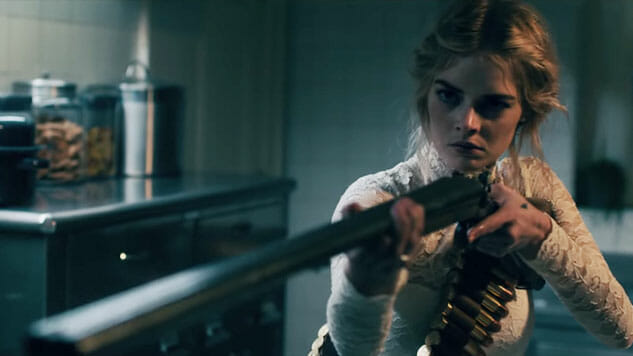Ready or Not

Eat the rich—or at least defeat them with some good ole Judeo-Christian magic. Weird that Ready or Not made it through the right-wing cultural abattoir while The Hunt was taken apart—maybe the latter sacrificed itself for the former—because Ready or Not is very much about how rich people are all psychopaths when confronted with the limits of their money and power, willing to indulge in whatever games, traditions or ancient blood rites proscribed by Satan they have to in order to stay on top. We know the Le Domas family is a hive of grotesque villainy from the beginning, before the true nature of her in-laws is ever revealed to Grace (Samara Weaving) on her wedding night: Ready or Not begins with people in gowns and tuxedos engaged in a violent chase through lavish hallways and gilded passageways, offering a brief, brutal glimpse of this family’s past matrimonial gatherings. No matter how kind or protective her new husband Alex (Mark O’Brien) is, we know he’s still a part of the Le Domas clan. He’s always bound to disappoint us.
Ready or Not revels in expectations—it’s a survival thriller, dark comedy, gross-out revenge splatterfest—but rarely exceeds them, treading well through each genre signifier, as suspenseful and funny and violent as any one of us could hope. Alex’s family, too, serves up plenty of delicious caricatures, all various shades of sly and sniveling: his preternaturally sarcastic brother Daniel (Adam Brody), cokehead sister Emilie (Melanie Scrofano), obviously extremely corrupt father Tony (Henry Czerny), obviously infrequently maternal mother Becky (Andie MacDowell) and sinister, laconic aunt Helene (Nicky Guadagni), who is maybe some sort of sorceror, as well as those who married into the family, Daniel’s equally insincere wife Charity (Elyse Levesque) and Fitch (Kristian Bruun), Emilie’s husband, who has a very Otho-from-Beetlejuice vibe. All congregate for the big wedding, though we learn that Alex has kept his family as little more than a distant reality during the past year and a half he’s spent with Grace, finally forced to drag her to the Le Domas compound now that tradition demands they make it official. Each family member makes their assessment of Grace, efficiently introducing themselves, reuniting with a brother or son or uncle they haven’t seen in some time. Marriage proceeds, and storytelling economy pushes us wonderfully and briskly toward the viscera of the film, giving us all the info we need to feel something when the carnage begins.
It isn’t until Emilie accidentally murders a nanny that Grace realizes this game her new inlaws have dragged her into involves a deadly version of hide and seek. Though Alex tries to keep his family from killing his wife before dawn breaks (unleashing a superstitious catastrophe foretold in family lore), Grace thrives on the relative incompetence of her drunk adversaries at stalking their Most Dangerous Game, able to escape hairy situations by leveraging how little Daniel cares about this whole cat-and-mouse mess anyway. Inevitably, the night gets gorier and gorier as Grace seems closer and closer to surviving daybreak, barreling toward a climax that squanders all bite any of the film’s satire could build. The rich assholes get what’s coming to them, but not because of anything they actually did, only because of their failure to do what they thought they were supposed to do. Grace’s exploitation at the mercy of the capitalistic death machine finds no resolution in her traumatizing wedding night. Even if rich people lose the battle this time, they will always win the war.
-

-

-

-

-

-

-

-

-

-

-

-

-

-

-

-

-

-

-

-

-

-

-

-

-

-

-

-

-

-

-

-

-

-

-

-

-

-

-

-








































